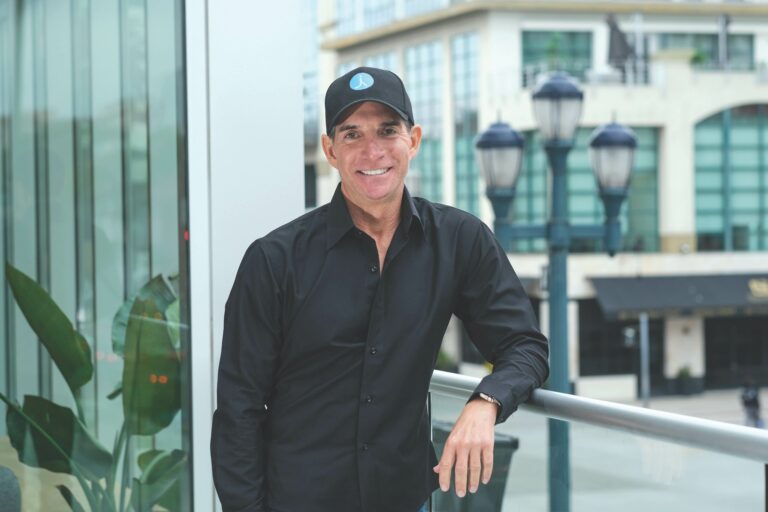
Deepfake technology, data breaches and the ease of stealing personal data make it even more vital for companies of all types to accurately identify and authenticate consumers and prospective partners and clients. In that effort, blockchain-supported virtual credentials are becoming more and more popular.
Dentity, a Santa Monica-based identity technology company, helps companies — and consumers — create and use such credentials.
Its users consolidate different forms of identification under a secure ID token and keep it in a digital wallet, a container for personal information. The owner can choose whom they share their identity data with, and when, without having it stored across different databases, a feature that reduces the possibility of falling prey to data hacks.
Dentity Chief Executive and founder Jeffrey Schwartz said that by leveraging the power of blockchain technology and digital signatures, organizations and individuals can more independently own their ID information and who gets to access it.
“They now have this portable identity verification that they can take with them if they’re logging into a banking app to verify their identity or trying to buy a beer or something at a venue,” Schwartz said. “The idea is that you verify once and then you can use it anywhere.”
Ownership of identity
Verifiable credential tokens let consumers hold their information close to the vest, while supporting businesses’ own security measures. When a business or entity no longer needs the information for a specific transaction or operation, the user can revoke access to protect their data. Barath Raghavan is a professor of computer science at USC Viterbi School of Engineering as well as the co-founder of Invisv, a computer and network privacy company. He said that giving users control over their online IDs and the way third parties can access them is invaluable to protecting user privacy.
“Verifiable credentials in general are a good way to avoid presenting one’s entire ID information to a third party while still allowing that third party to verify key pieces of the ID,” Raghavan said.
The credentials can be used when making purchases that require ID, such as opening a bank account or signing contracts, and can even be used to vet a stranger when selling something online or going on a blind date.
“You can no longer trust self-attested identity information,” Schwartz said. “The reality is that just doesn’t work anymore.”
Dentity recently partnered with Woodland Hills-based Consumer Attorney Marketing Group, an advertising agency focused on lawyers and law firms. It developed a new platform called CAMG Verify, which the attorney-marketing group is licensing for use in the legal industry. It’s a self-service portal for law firms to quickly verify clients’ identities. For example, when setting up large mass tort cases, it’s vital to reduce identity fraud and improve client security since lawyers may not meet all of the plaintiffs in person. Schwartz says that law offices often onboard their clients digitally and added that the industry has next to no security safeguards.
Schwartz was previously the vice president of corporate affairs at The Walt Disney Co. and has been working in the automotive marketing industry for several years. After founding three companies, including Santa Monica-based vehicle data company SureSale, he came up with the idea for Dentity after noticing that there wasn’t an “enterprise-grade” identity verification system for consumers who were looking to purchase automobiles.
“This new identity model gives enormous power to a consumer,” Schwartz said. “It’s more private, it’s more secure, more privacy-respecting … it’s a better form of identity, and it prevents this constant repetitive process that we always have to go through of giving more of our personal information to more websites.”
Streamlining sales
Dentity had a February seed funding round led by Blockchange Ventures and AARP. The company declined to disclose the amount raised. AARP was specifically interested in the technology’s potential to reduce elder fraud. Senior citizens are major targets of scammers, and allowing them to better verify the identity of caregivers or providers is vital. In addition to its partnership with Consumer Attorney Marketing Group, Dentity announced a partnership in March with venue and festival collective Ad.Ventures. It kicked off at this year’s SXSW festival and allowed attendees to use Dentity credential tokens when purchasing alcoholic beverages, shortening lines and resulting in “record” bar tabs while reducing the risk of bartenders accepting fake IDs.
Schwartz said that Dentity issued 77,000 credentials in a single week at SXSW. The venture will be launching with several new event venues in June, including one “major” venue in L.A. that Schwartz declined to name.
“We’re with an Apple developer program right now to enable our credentials to (sit) in your Apple Wallet with a near-field communication chip,” Schwartz said. “(The venue) has machines that they want to start selling alcohol from. Imagine you walk up to a vending machine, you can a QR code to provide your identity … so we can massively improve the convenience and the consumer journey in a venue.”
Dentity’s revenue comes from the origination and authentication of IDs on the company’s network. Schwartz said that consumers never pay to create and utilize a credential token. Instead, the holder would take their credential to a company or entity that is requesting proof of ID and that company or entity would pay a small fee to confirm the token’s veracity and authenticity with the issuer of the credential … in this case, that’s Dentity.
“Your identity is more than just your digits,” Schwartz said. “Web3 gives us this incredible power to control those identity markers, those attributes, and then share them with companies, brands, people you meet online, whomever you want to share with. That’s why we started Dentity and the gist of what we’re trying to do.”
